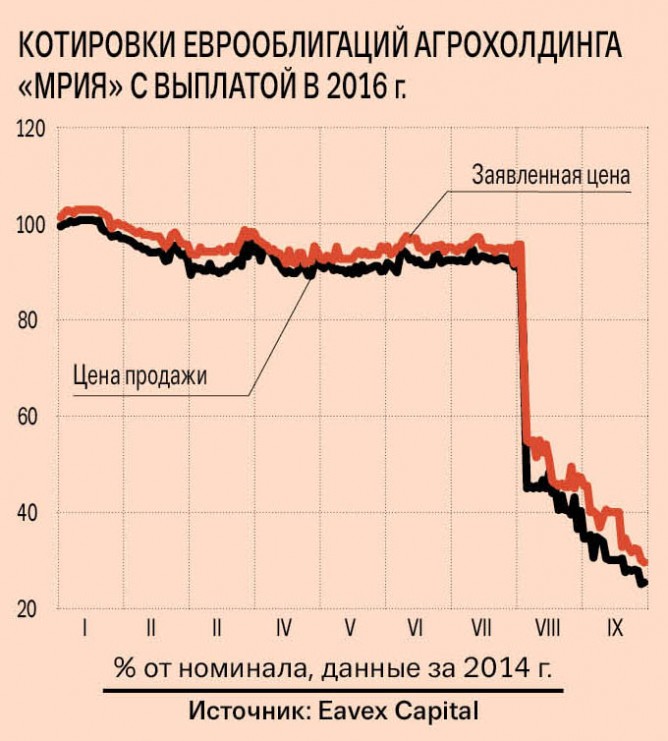Business
threatsMriya’s bonds hit a record low

Yesterday, the quotations of Eurobonds of Mriya Agro Holding maturing in 2016 dropped to their historic low – by 5 percentage points to 25-30% of the nominal value. The reason for the drop is the announcement of the company on the website of the Irish Stock Exchange, where the company is traded. “The company informed about replacement of its general director and establishment of a special Dataroom for bondholders on its website,” says analyst at Eavex Capital Ivan Dzvinka. Another representative of the financial market, on condition of anonymity, said: “While prior to this, the bonds were traded stably for some time, the decrease in quotations can indeed be due to the company’s statement.”
As a reminder, on Tuesday, the company announced the resignation of Mykola Huta as Chief Operating Officer and appointment of Vladyslav Luhovskiy. Prior to this, Luhovskiy was the COF of one of the holding’s companies and since March 2014 has been a member of the board of directors of Mriya.
For improvement of connection with the bondholders, Mriya created a special Dataroom, which contains additional information about the company and financial data that may be relevant to the lenders. However, Mriya specified that it shall not make any representation regarding the accuracy and relevance of the information contained in the Dataroom. Moreover, in order to access the data, bondholders must confirm their status. They must also give their consent that they will not perform any transactions with the notes that they hold without Mriya’s approval. Dzvinka believes that the published announcement suggests that the company has hit a dead-end.
A nosedive
Senior analyst at ART Capital Investment Company Andriy Patiota ties the decline in the value of the bonds to the company’s financial difficulties. On August 1 Mriya announced that it could not fulfill its obligations on bonds to the tune of US $400 mn maturing in 2018 with a 9.45% coupon. According to the company’s announcement on the ISE website, the holding is studying the possibility of restructuring the balance with the aim of restoring its financial viability. After the publication of the announcement quotations of Mriya’s bonds collapsed over a day by 17-25 percentage points to 70-72% of their nominal value. On the following day, the notes were traded at 45-50% of their nominal value. Later information appeared on the website that Mriya failed to make approximately US $9 mn in interest payments and approximately US $120 mn in amortization payments and principal repayments. Affiliated entities of the company, for which Mriya provided corporate guarantees of approximately US$200 mn in debt obligations, failed to pay another US $58 mn.
At the meeting on August 21, the bondholders of Mriya decided to set up a committee representing their interests within the framework of debt restructuring. Mriya also fell into disgrace with short-term lenders. As Capital wrote earlier, Credit Agricole is trying to collect US $27.3 mn from Mriya through the courts. “I think that in anticipation of the company’s decision (regarding the way out of the situation – Capital) prices are falling. Not all sides are patient enough to wait for the decision,” says Patiota.
Mriya is involved in developing a financial model of the company’s growth, which will be presented to the bondholders and other lenders in the middle of October. It should contain forecasts of financial indicators and cash flow in the medium term. This, as the ag holding believes, will serve as the basis for discussion of debt restructuring.
Capital’s source, close to Mriya, claims that the model has been developed, but not finalized. At the moment, specialists at Deloitte acting as independent consultants are working on it. At the request of the lenders, the agro holding plans to conduct an independent audit of its assets.
Gloomy prospects
The probability of bonds maturing in 2016 being paid off on time is extremely low, says Dzvinka. “Mriya is a vivid example of how building a business with only family brains and without involving experts, who cost a lot, is doomed to fail,” he says. If the company fails to agree with banks and bondholders, Mriya risks of going belly up, adds a representative of the financial market close to the company. “The situation is dire. However, it is possible that the company will manage to pull out of the crisis,” he says, adding that creation of Dataroom on such conditions raises the risks of the lender. “If something is wrong in the data, the company is not responsible,” he assured. Dzvinka admits that smart bondholders will find a way to obtain access to Dataroom without losing their capacity to effectuate transactions with securities. “Overall, the idea of creation of a system of access to information suggests that the real financial situation and future prospects of the recovery of Mriya are extremely grim,” he believes.
Patiota refrained from making any assessments. “I’m afraid to give any forecasts. We should wait until the middle of October and see what the company has to offer,” he told Capital. At the same time, Executive Director of the Ukrainian Club of Agrarian Business Oleksandr Zhemoida notes that the financial difficulties of Mriya have become an obstacle to accessing finances of other players on the agrarian market.







 of the agreement of syndication with Financial Times Limited are strictly prohibited. Use of materials which refers to France-Presse, Reuters, Interfax-Ukraine, Ukrainian News, UNIAN agencies is strictly prohibited. Materials marked
of the agreement of syndication with Financial Times Limited are strictly prohibited. Use of materials which refers to France-Presse, Reuters, Interfax-Ukraine, Ukrainian News, UNIAN agencies is strictly prohibited. Materials marked  are published as advertisements.
are published as advertisements.